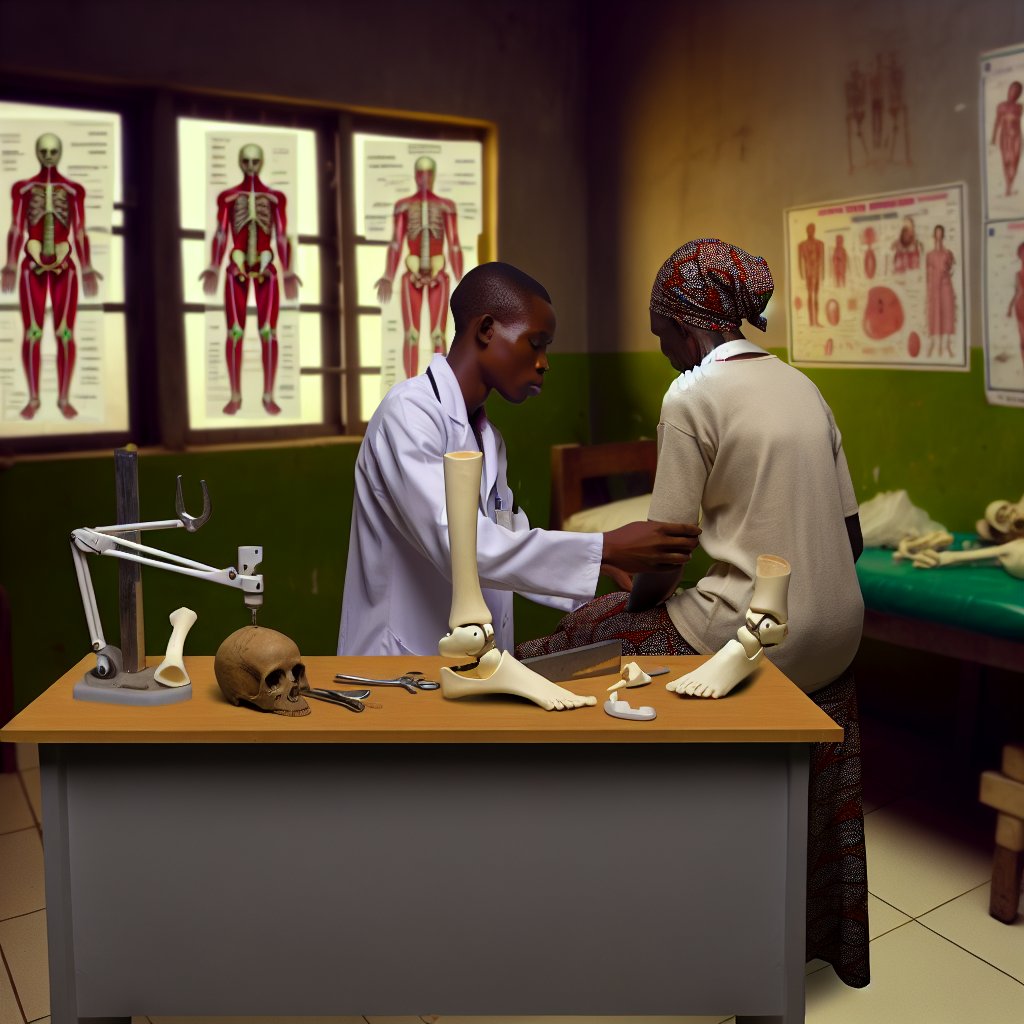INTRODUCTION
Orthopaedic technology plays a crucial role in Nigerian healthcare.
This technology provides support to patients with musculoskeletal injuries and disorders.
Through the use of orthopaedic tech, patients receive necessary assistance.
This support helps in managing their conditions, promoting faster recovery.
Ultimately, it leads to an improved quality of life.
Shortage of Orthopaedic Specialists in Nigeria
The scarcity of orthopaedic specialists in Nigeria is a major healthcare challenge.
With a population of over 200 million people, the ratio of orthopaedic specialists to patients is significantly low.
Challenges of Shortage:
- Lack of training institutions for orthopaedic specialists.
- High demand for orthopaedic services due to road accidents and other trauma cases.
- Brain drain as many specialists leave the country for better opportunities abroad.
Impact on Healthcare:
- Long waiting times for patients to access orthopaedic care.
- Overburdening of the few available specialists, leading to burnout and decreased quality of care.
- Inadequate follow-up and management of orthopaedic conditions.
Role of Orthopaedic Tech in Bridging the Gap
Orthopaedic technologists play a crucial role in complementing the limited number of specialists in Nigeria.
They are trained professionals who assist in the diagnosis, treatment, and rehabilitation of patients with orthopaedic conditions.
Ways Orthopaedic Tech Can Help:
- Assisting in the application of casts, braces, and other orthopaedic devices.
- Performing non-invasive procedures like traction and splinting.
- Monitoring patient progress and providing feedback to orthopaedic specialists.
Collaboration with Specialists:
- Working closely with orthopaedic surgeons to support surgical interventions.
- Providing assistance in the operating room during orthopaedic procedures.
- Contributing to post-operative care and rehabilitation programs for patients.
Benefits of Utilizing Orthopaedic Tech
By leveraging the skills and expertise of orthopaedic technologists, healthcare facilities in Nigeria can enhance the quality of orthopaedic care.
The benefits of utilizing orthopaedic tech include:
Improved Access to Care:
- Reduced waiting times for patients to receive treatment.
- Increased availability of orthopaedic services in underserved areas.
- Enhanced outreach programs to educate communities on orthopaedic conditions.
Cost-Effective Solutions:
- Optimizing resources by utilizing orthopaedic tech for routine procedures.
- Minimizing the need for referrals to specialists for basic orthopaedic care.
- Reducing healthcare costs for patients and the healthcare system as a whole.
Professional Development Opportunities:
- Creating career pathways for healthcare workers interested in orthopaedics.
- Offering continuous training and upskilling for orthopaedic technologists.
- Promoting specialization in orthopaedic tech to address specific patient needs.
Impacts of Orthopaedic Technologists on Patient Care
The importance of orthopaedic technologists in Nigerian healthcare cannot be overstated.
These professionals play a vital role in bridging the gap and improving access to quality care for patients with orthopaedic conditions.
By recognizing and utilizing the expertise of orthopaedic tech, healthcare facilities can address the challenges posed by the scarcity of specialists.
This ultimately leads to better outcomes for patients across the country.
Increasing demand for orthopaedic services
- Rising incidence of musculoskeletal injuries and disorders in Nigeria
- Demand for orthopaedic services has grown over the years
Musculoskeletal injuries and disorders are becoming increasingly common in Nigeria.
The population is experiencing a rise in accidents, sports-related injuries, and age-related conditions.
All contribute to the higher demand for orthopaedic services.
Rising incidence of musculoskeletal injuries and disorders in Nigeria
The incidence of musculoskeletal injuries and disorders in Nigeria has been on the rise in recent years.
Factors contributing to this increase include poor road infrastructure leading to accidents.
Lack of workplace safety regulations plays a part as well.
A growing aging population further contributes to this issue.
Sports-related injuries have also become more prevalent as more Nigerians engage in physical activities and sports.
With inadequate training and equipment, athletes are at a higher risk of sustaining injuries.
This situation necessitates orthopaedic care.
Additionally, the prevalence of conditions such as osteoarthritis, rheumatoid arthritis, and osteoporosis is increasing.
This increase is due to lifestyle changes, poor diet, and lack of awareness about prevention and treatment options.
Demand for orthopaedic services has grown over the years
As a result of these factors, the demand for orthopaedic services in Nigeria has grown exponentially.
Hospitals and clinics are seeing more patients with musculoskeletal injuries and disorders.
This trend puts a strain on the healthcare system.
Orthopaedic surgeons, physiotherapists, and orthopaedic technicians are in high demand.
These professionals provide diagnosis, treatment, and rehabilitation services.
This situation has led to an increased need for training programs and education in the field of orthopaedics.
Furthermore, the rise in demand for orthopaedic services has highlighted the need for improved infrastructure and resources.
Hospitals are investing in advanced technology, surgical equipment, and specialized orthopaedic units.
These investments aim to cater to the increasing number of patients seeking orthopaedic care.
The increasing demand for orthopaedic services in Nigeria underscores the importance of orthopaedic technicians.
These professionals play a crucial role in assisting orthopaedic surgeons.
They provide patient care and ensure efficient delivery of orthopaedic services.
With the rising incidence of musculoskeletal injuries and disorders, the demand for skilled orthopaedic technicians will continue to grow.
Transform Your Career with Expert Guidance
Get personalized mentorship consulting that’s tailored to your unique path. Our expert advice is actionable and exclusive.
Get StartedTheir role will become indispensable in Nigerian healthcare.
Explore Further: Influence of Traditional Medicine on Nigerian Veterinary
Orthopaedic technicians play a crucial role in the rehabilitation process for patients recovering from injuries or surgeries.
- Assist in implementing treatment plans prescribed by physicians.
- Provide support and guidance to patients during their recovery journey.
- Monitor the progress of patients and adjust treatment plans accordingly.
- Instruct and educate patients on exercises and activities to aid in recovery.
- Assist patients with mobility devices and orthotic appliances as needed.
Orthopaedic technicians work closely with physical therapists, occupational therapists, and other healthcare professionals in rehabilitation settings.
- Collaborate with the rehabilitation team to ensure coordinated care for patients.
- Communicate patient progress and any concerns to the healthcare team.
- Participate in the development and modification of rehabilitation programs.
- Provide emotional support to patients as they navigate the challenges of rehabilitation.
- Assist in the maintenance and upkeep of rehabilitation equipment and tools.
The role of orthopaedic technicians in rehabilitation is essential for helping patients regain function and mobility after experiencing injuries or undergoing surgical procedures.
Uncover the Details: Continuing Education for Nigerian Radiographers
Orthopaedic Tech in Orthopaedic Surgeries
Orthopaedic technicians play a crucial role in assisting orthopaedic surgeons during various procedures.
Here’s how they contribute to the success of orthopaedic surgeries:
- Preparing the Operating Room: Orthopaedic techs are responsible for setting up the operating room before the surgery, ensuring that all necessary instruments and equipment are ready for use.
- Assisting with Patient Positioning: They help position the patient correctly on the operating table, ensuring optimal access for the surgeon to perform the procedure.
- Handing Instruments to Surgeons: During the surgery, orthopaedic techs provide the surgeon with the required instruments in a timely and organized manner, facilitating a smooth workflow.
- Operating Imaging Technology: Orthopaedic techs may also operate imaging technology such as X-ray machines or fluoroscopy to assist the surgeon in visualizing the affected area.
- Applying and Removing Casts: After the surgery, orthopaedic techs are trained to apply casts or splints to immobilize and protect the operated limb, promoting proper healing.
Significance of Orthopaedic Tech in Successful Outcomes
Orthopaedic technicians play a vital role in ensuring successful outcomes in orthopaedic surgeries.
Their contributions are invaluable in the following ways:
- Reducing Surgical Errors: By assisting the surgeon effectively, orthopaedic techs help minimize the risk of errors during procedures, leading to better outcomes for patients.
- Enhancing Efficiency in the Operating Room: With their organizational skills and knowledge of surgical procedures, orthopaedic techs contribute to the smooth operation of the OR, ensuring timely completion of surgeries.
- Improving Patient Safety: Orthopaedic techs are trained to prioritize patient safety, from ensuring a sterile environment in the OR to monitoring the patient’s vital signs throughout the surgery.
- Supporting Surgical Team Collaboration: Orthopaedic techs work closely with the entire surgical team, fostering effective communication and collaboration to achieve successful surgical outcomes.
- Providing Postoperative Care: After the surgery, orthopaedic techs continue to support the patient by providing postoperative care instructions and assisting with follow-up appointments as needed.
Orthopaedic technicians play a critical role in orthopaedic surgeries, contributing to the success of procedures and ensuring the well-being of patients throughout the surgical process.
See Related Content: Radiological Sciences: Patient Interaction Tips

Orthopaedic Care in Nigeria
When it comes to orthopaedic care in Nigeria, affordability and accessibility are crucial factors that need to be considered.
Orthopaedic technicians play a vital role in making orthopaedic care more cost-effective and readily available to patients, especially those in remote or underserved areas.
Cost-Effectiveness of Orthopaedic Tech
Orthopaedic technicians offer a cost-effective alternative to orthopaedic specialists.
These professionals are trained to assist in the diagnosis, treatment, and rehabilitation of orthopaedic conditions.
This reduces the need for expensive surgical interventions.
By utilizing the expertise of orthopaedic techs, healthcare facilities can provide quality care to patients at a fraction of the cost.
Accessibility to Patients in Remote Areas
One of the significant advantages of orthopaedic techs is their ability to reach patients in remote or underserved areas.
Orthopaedic specialists may not be readily available in these areas.
These technicians can set up mobile clinics, conduct outreach programs, and provide on-site care to individuals who would otherwise have limited access to orthopaedic services.
Orthopaedic techs bridge the gap between patients in rural communities and orthopaedic care.
By bringing essential medical expertise directly to those who need it most, they ensure that even the most vulnerable populations have access to timely and effective orthopaedic treatment.
Importance of Training and Education
- Orthopaedic technicians must undergo rigorous training and education to acquire the necessary skills to assist orthopaedic specialists effectively.
- By investing in the training of orthopaedic techs, healthcare facilities can expand their workforce and increase their capacity to provide orthopaedic care to a larger number of patients.
- Continuous education and professional development opportunities are essential for orthopaedic technicians to stay updated on the latest advancements in orthopaedic technology and treatment protocols.
Collaboration with Orthopaedic Specialists
Orthopaedic techs work closely with orthopaedic specialists to deliver comprehensive care to patients.
Their role in the healthcare team is crucial in ensuring that treatment plans are executed effectively.
By collaborating with orthopaedic techs, orthopaedic specialists can focus on more complex cases.
Meanwhile, the techs handle routine procedures and follow-up care.
This teamwork approach optimizes the efficiency of orthopaedic services and enhances patient satisfaction.
Orthopaedic Technicians in Nigeria
Orthopaedic technicians play a vital role in making orthopaedic care affordable and accessible to patients in Nigeria.
Through their expertise and dedication, they contribute significantly to improving the overall quality of orthopaedic services in the country.
As healthcare systems continue to evolve, the role of orthopaedic techs will become increasingly important.
They will meet the orthopaedic care needs of the Nigerian population.
By recognizing and supporting the invaluable contributions of orthopaedic technicians, we can ensure that all individuals have access to the orthopaedic care they deserve.
Gain More Insights: Biomedical Technology and Disease Management Nigeria
Training and Education for Orthopaedic Tech in Nigeria
Training and education requirements for becoming an orthopaedic tech in Nigeria:
- Completion of a diploma or certificate program in orthopaedic technology.
- Understand anatomy, physiology, orthopaedic conditions, and treatment methods.
- Gain practical skills in casting, splinting, wound care, and patient assessment.
- Participate in clinical rotations to experience real-world orthopaedic care.
- Passing certification exams to demonstrate competency in the field.
The need for more educational programs and resources to support the growth of orthopaedic tech in the country:
- Insufficient training facilities and programs for aspiring orthopaedic techs in Nigeria.
- Limited access to up-to-date knowledge and advancements in orthopaedic technology.
- High demand for skilled orthopaedic techs in hospitals and clinics across the country.
- Lack of specialized training opportunities for those interested in orthopaedic technology.
- Collaboration with international organizations to provide additional educational support and resources.
Importance of Orthopaedic Technicians in Nigeria
Orthopaedic technicians play a crucial role in the healthcare system in Nigeria.
They are essential in providing specialized care to patients with musculoskeletal conditions.
These professionals help patients regain their mobility and functionality.
Orthopaedic techs contribute to the overall improvement of healthcare delivery.
They assist orthopaedic surgeons in surgeries and provide post-operative care.
Additionally, they assist in rehabilitation services to enhance recovery.
Their expertise in fitting and adjusting orthopaedic devices is invaluable.
Devices such as braces, prosthetics, and orthotics significantly improve patient outcomes and quality of life.
Orthopaedic techs also educate patients on proper device usage and care.
This education ensures optimal results and helps in preventing complications.
Reinforcing the importance of orthopaedic techs in the healthcare system is essential.
The need for their presence and continued training is evident.
This is necessary to meet the growing demand for orthopaedic services in Nigeria.
In summary, orthopaedic technicians are indispensable in improving healthcare delivery.
Their contributions ensure that patients with musculoskeletal conditions receive specialized care.
This care enables patients to lead healthy and active lives.
Additional Resources
Can traditional bonesetters become trained technicians? Feasibility …
Burnout and presenteeism among healthcare workers in Nigeria …




